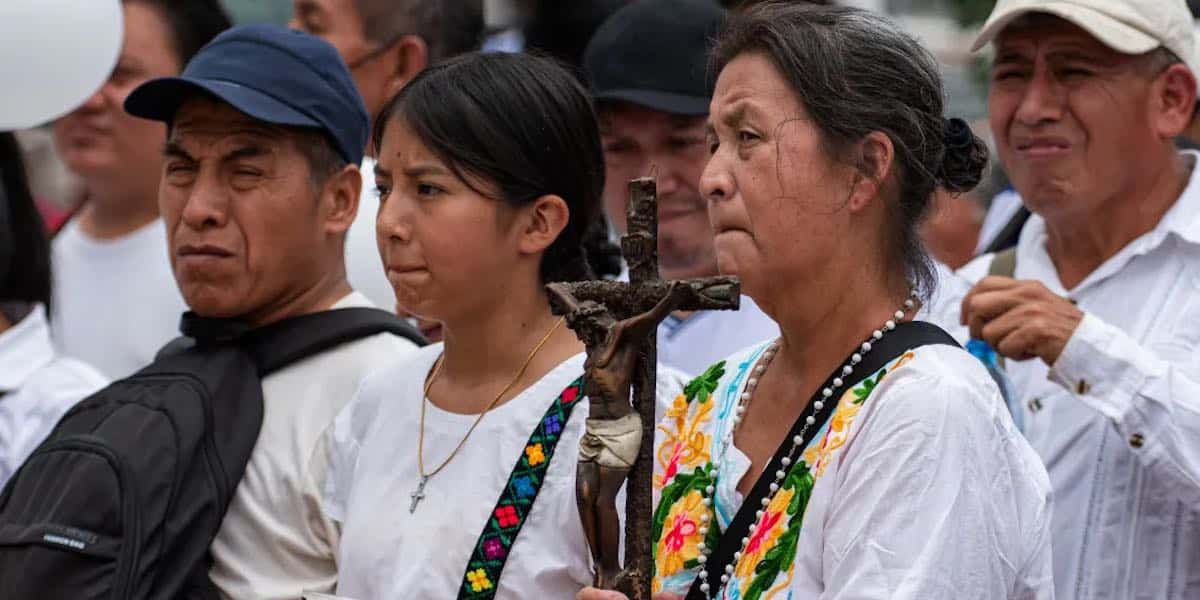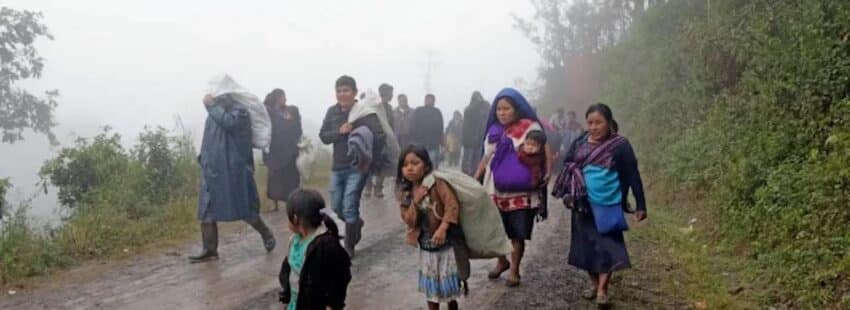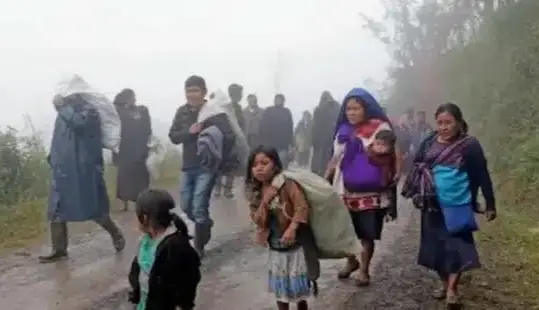In recent years, human displacement of communities, especially indigenous ones, has been continuously reported in the state of Chiapas. For this reason, the Church has had to include care for these thousands of people, primarily victims of organized crime that has seized their homes and land, as part of its pastoral work.
To learn more about this issue, Vida Nueva interviewed Sister Gloria Estela Murúa Valencia, Coordinator of Social Pastoral and Human Mobility for the Diocese of San Cristóbal de Las Casas, who stated that there is a wealth of solidarity in this diocesan territory: “The communities recognize the pain, suffering, and profound need of those who have suffered displacement, loss, illness, and death due to violence.”
“From their poverty, they share their harvests of corn, beans, coffee, various food supplies, clothing, blankets, and cleaning materials so that humanitarian aid can be provided from the collection centers organized for this purpose,” she added.
Productive Projects for the Displaced
In this regard, he noted that the parishes and missions distributed in pastoral areas are providing support with shelter, physical and emotional health care, and coordinating the distribution of humanitarian aid provided by the communities.
The Diocesan Caritas, he said, also manages resources to deliver support to the areas where it is needed, both to communities fleeing violence and to groups displaced by natural disasters.
“Based on this, it has implemented a risk prevention program, offering training to the areas experiencing these impacts. Another of its best practices is to facilitate training to undertake productive projects that provide resources to families experiencing internal displacement,” he added.
The Aftermath of Internal Displacement
Sister Gloria lamented that internal displacement in the Diocese of San Cristóbal de Las Casas, due to violence perpetrated by organized crime and territorial disputes between drug cartels, “has left profound consequences for the population: loss of resources, scattered families, sadness, depression, chronic illness, deaths, murders, and disappearances.”
Although, she stated, there is a presence of various police and military security forces, as well as the Immediate Reaction Force “Pakal” in regions where severe violence has occurred, “the population does not perceive peace and safe conditions.”
Therefore, she asserted, “as a Church, we continue to accompany their processes; parish pastoral teams strive to maintain closeness, support, listening, and collaboration with all the spiritual and material means and resources at their disposal to serve the communities. The unity of the pastoral zones in the diocesan process nourishes and strengthens such resources.”
Displaced Persons and Their Care
Sister Gloria shared with Vida Nueva some data the diocese has regarding the groups who have been displaced in the Highlands Region of Chiapas.
He explained that Chenalhó, whose population speaks the Tsotsil language, had been divided for some time due to community issues. The Tsanembolom Fraction (FT) allied itself with the criminal group “Los Herrera” and on July 14, 2024, threatened those who refused to join them and cooperate in purchasing ammunition. This led to the displacement of the residents of Tsanembolom Centro (TC), especially women, who eventually took refuge in a school.
“During those days, the few soldiers who were there shared their food with them and, to save them from the gunfire that reached the school, took them to the school auditorium. They were protected by the soldiers while the sector police promised them they would be rescued on the 16th of that same month. It was difficult for them because they wanted to exchange them for the hitman Felipe Jiménez Gómez, imprisoned in El Amate.”
That group of displaced people, Sister Gloria said, was released on July 20, “transferred to San Cristóbal, where they spent one night, and then taken to the Chenalhó Cultural Center, where they are currently being held. They have a diverse religious makeup: Presbyterians, Pentecostals, Baptists, and Catholics, which, so far, hasn’t caused them any major problems.”
Regarding support for these displaced people, she noted, “it’s the municipality, through Civil Protection; they provided them with food and medicine (at a medical clinic), and the Presbyterians visited them. This support has ceased to be systematic, since, since January 25, 2025, the displaced people themselves submitted a request for food to the Coordinating Center for Indigenous Peoples, and as of this April, they continue to demand humanitarian aid from state agencies.”
Another group of displaced people are those from San José del Carmen (territorially belonging to Pantelhó) and ecclesiastically to Chenalhó. They requested refuge in the home of César Santis (murdered on April 11, 2024), where they lived until the beginning of 2025.

Displaced people from San Clemente (Pantelhó)
Support for these people, Sister Gloria recounts, came from the parish communities and Caritas; “They are currently in their homes.”
A third group is the displaced from La Esperanza; “they were invisible, as they joined relatives and were welcomed by families from Acteal Altos and others; they were supported by Caritas and the faithful of the parish.”
A fourth group is from San Clemente (Pantelhó): “They were displaced by the ‘Sirines,'” who joined one of the armed groups, attacked the residents, and are practically the only family living in that community. Fear forced them to leave, and there are no conditions for their return; Some families went to C’anolal, Acteal Altos, Chenalhó… ecclesiastically they belong to Chenalhó, but the catechists also left.”
Displaced from the Border Region with Guatemala
The authorities of Yabteclum, she said, “where the Parish Pastoral Center is located, to prevent problems, refused to accept displaced people into the community, since displaced families from Pantelhó decided to stay in 2021.”
The parish council, in coordination with the Bees of Acteal organization, Sister Gloria noted, “suggested that the communities of San José del Carmen and de la Esperanza take refuge in Acteal, but they did not accept the minimum safety conditions they proposed (for example, avoiding going out alone, at any time). However, some families belonging to the organization were welcomed in Acteal.”
The fifth group of displaced persons is from the border region with Guatemala; for the past two years, and “with greater emphasis during 2024,” the clashes between armed drug trafficking groups have caused the displacement of thousands of families from the municipalities of Comalapa and Chicomuselo. The majority of the population has been returning to their communities.
Families “terrified to undertake the return”
However, he noted, “many young people moved to different places with relatives or acquaintances to continue their studies outside the control of organized crime groups, while some families and women with children and adolescents remain in a state of forced displacement, having managed to enroll their children in basic education, as they lost that opportunity due to the lack of access to teachers in the territory marked by violence.”
Some families, he said, “are afraid to undertake the return due to the trauma of the hours of confrontation they experienced from their homes.” Vulnerable to gunfire, they feel unprepared to return; there are families scarred by the disappearance of their relatives, and this fear prevents them from returning.”
Many families, he said, “have lost their crops, their animals, and their homes are severely damaged. They feel their chances of survival upon their return are more limited. Therefore, they are embarking on new means of subsistence, experiencing precariousness due to having to pay rent and the fact that ‘everything can be bought,’ while in their territories, the production of eggs, poultry, and the collection of various foods and native medicinal plants are of great help to their daily sustenance.”

Source: vidanuevadigital




